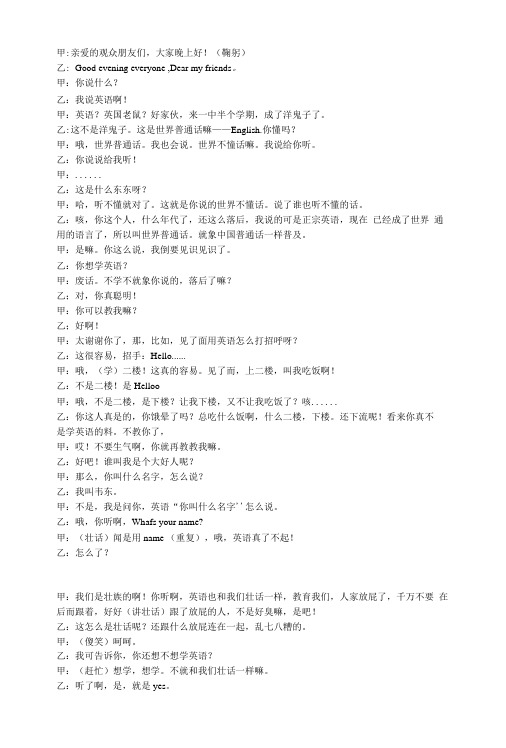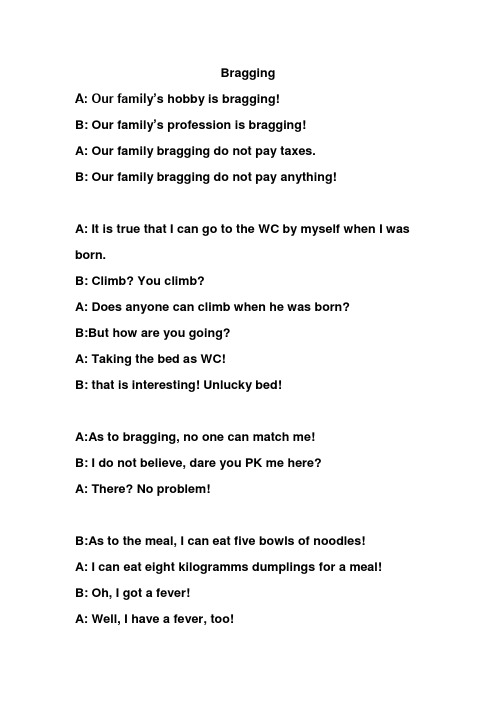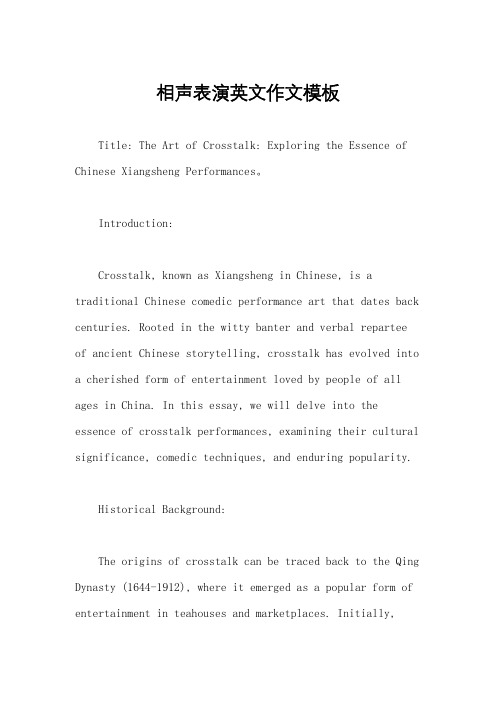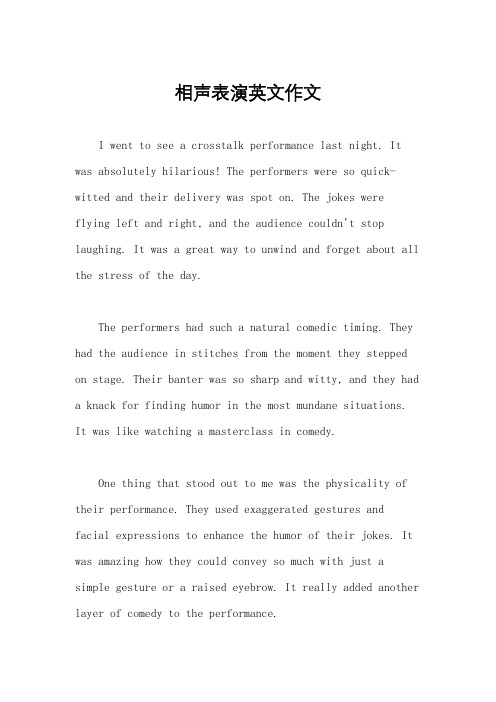英文 二人相声-吹牛
适合学生表演的相声《英语》

甲:亲爱的观众朋友们,大家晚上好!(鞠躬)乙: Good evening everyone ,Dear my friends。
甲:你说什么?乙:我说英语啊!甲:英语?英国老鼠?好家伙,来一中半个学期,成了洋鬼子了。
乙:这不是洋鬼子。
这是世界普通话嘛——English.你懂吗?甲:哦,世界普通话。
我也会说。
世界不憧话嘛。
我说给你听。
乙:你说说给我听!甲:......乙:这是什么东东呀?甲:哈,听不懂就对了。
这就是你说的世界不懂话。
说了谁也听不懂的话。
乙:咳,你这个人,什么年代了,还这么落后,我说的可是正宗英语,现在已经成了世界通用的语言了,所以叫世界普通话。
就象中国普通话一样普及。
甲:是嘛。
你这么说,我倒要见识见识了。
乙:你想学英语?甲:废话。
不学不就象你说的,落后了嘛?乙;对,你真聪明!甲:你可以教我嘛?乙;好啊!甲:太谢谢你了,那,比如,见了面用英语怎么打招呼呀?乙:这很容易,招手:Hello......甲:哦,(学)二楼!这真的容易。
见了而,上二楼,叫我吃饭啊!乙:不是二楼!是Helloo甲:哦,不是二楼,是下楼?让我下楼,又不让我吃饭了?咳......乙:你这人真是的,你饿晕了吗?总吃什么饭啊,什么二楼,下楼。
还下流呢!看来你真不是学英语的料。
不教你了,甲:哎!不要生气啊,你就再教教我嘛。
乙:好吧!谁叫我是个大好人呢?甲:那么,你叫什么名字,怎么说?乙:我叫韦东。
甲:不是,我是问你,英语“你叫什么名字''怎么说。
乙:哦,你听啊,Whafs your name?甲:(壮话)闻是用name (重复),哦,英语真了不起!乙:怎么了?甲:我们是壮族的啊!你听啊,英语也和我们壮话一样,教育我们,人家放屁了,千万不要在后而跟着,好好(讲壮话)跟了放屁的人,不是好臭嘛,是吧!乙:这怎么是壮话呢?还跟什么放屁连在一起,乱七八糟的。
甲:(傻笑)呵呵。
乙:我可告诉你,你还想不想学英语?甲:(赶忙)想学,想学。
“吹牛”用英文怎么说?“blowcow”?

“吹⽜”⽤英⽂怎么说?“blowcow”?⽣活中肯定会遇到不少喜欢说⼤话、爱吹⽜的⼈。
那⼤家知道“吹⽜”⽤英⽂怎么说吗?英语中“吹⽜”的表达居然和cow毫⽆关系!那“吹⽜”的英语表达到底是什么呢?赶快跟丸⼦⼀起学习⼀下吧~Big TalkBig Talk 吹⽜吹⽜,也叫说⼤话,英语中“Big Talk”就可以表⽰“吹⽜”例句:That guy likes to boast about he had 20 girlfriends before, but it’s obvious that he is lying.那个⼈很喜欢吹⽜说他以前曾经有20个⼥朋友,可是很明显他就是在撒谎呀。
swankswank 吹⽜, 说⼤话;⾃吹;⾃夸例句:I have always been against swanking about all the things I have been lucky enough to win.我⼀向不喜欢和别⼈炫耀⾃⼰因为幸运⽽取得的那些成就。
bragbrag 吹⽜, 夸耀, 夸⼝, 夸, 说⼤话, 瞎吹例句:I don't wanna brag but a lot of the ideas were mine!我不想吹嘘,不过⼤部分主意都是我出的!full of hot airfull of hot air 形容某⼈谈话空泛不切实际,夸夸其谈;吹⽜,说⼤话。
这个词是美国常⽤的习语,最早开始使⽤的时候只有Hot air,⽤来形容冗长的话犹如⼀阵热空⽓,令⼈不悦⼜空泛不实际。
在现在的⼝语中更加简单,将 Hot air ⽤ It 代替,简化成我们在美剧中常看到的 Full of it。
例句:Don’t mention it. He is so full of hot air.别提了,他⼀直在胡扯。
a fast talkera fast talker 油嘴滑⾆的演说者;吹⽜⼤王按字⾯意思翻译为他是⼀个说话很快的⼈,⼤家千万不要这样翻译哦,这⾥要对 fast talker 这个短语要熟悉:fast talker是⼀个固定短语表⽰花⾔巧语骗⼈的⼈,不是说说话快的⼈。
吹牛 翻译

吹牛翻译Blowhard Translation (700 words)In Chinese, "吹牛" (chui niu) is a colloquial expression that means "to boast" or "to brag." Whether in a serious or humorous context, it refers to someone exaggerating their accomplishments, abilities, or possessions to impress others. This behavior is commonly observed in social interactions and is often met with skepticism or amusement. The following is a translation of "吹牛" into English:Blowhard"Blowhard" is an English term often used to describe someone who frequently boasts or brags. It conveys the idea of a person who excessively exaggerates their achievements, skills, or possessions in order to appear more impressive or important than they actually are. This term captures the essence of "吹牛" by highlighting the act of blowing hot air or talking big without substantial evidence.The concept of a blowhard can be encountered in various settings, such as the workplace, social gatherings, or even among friends. In conversations, a blowhard will often interrupt others to divert attention to themselves and launch into elaborate descriptions of their supposed accomplishments. They may claim to have achieved incredible feats or milestones, possess vast knowledge or expertise, or own extravagant possessions.Dealing with a blowhard can be challenging. Some people chooseto ignore their exaggerated claims and simply let them continue with their boastful talk, recognizing that it may be more for personal validation than to deceive others. Others may find entertainment value in listening to their elaborate stories, treating them as amusing anecdotes without taking them seriously.However, it's important to discern between a harmless blowhard and someone who uses boasting as a manipulative tactic. The latter type aims to deceive or manipulate others by making grandiose claims for personal gain or to exert control. While blowhards may be annoying or attention-seeking, they typically do not have malicious intent behind their behavior.In some cases, a blowhard's self-aggrandizement may lead to consequences. If a person consistently exaggerates their abilities or qualifications in professional settings, it can damage their credibility and reputation. Colleagues or employers may become skeptical of their claims, hindering career advancement or opportunities for collaboration. In personal relationships, excessive boasting can strain friendships and lead to distrust or skepticism. To conclude, "吹牛," when translated into English, can be represented by the term "blowhard." While it is a colloquial expression describing someone who boasts or brags, it is essential to differentiate between harmless showmanship and manipulative intent. Understanding this concept can help navigate social interactions and prevent potential misunderstandings.。
英文 二人相声-吹牛

BraggingA: Our family’s hobby is bragging!B: Our family’s profession is bragging!A: Our family bragging do not pay taxes.B: Our family bragging do not pay anything!A: It is true that I can go to the WC by myself when I was born.B: Climb? You climb?A: Does anyone can climb when he was born?B:But how are you going?A: Taking the bed as WC!B: that is interesting! Unlucky bed!A:As to bragging, no one can match me!B: I do not believe, dare you PK me here?A: There? No problem!B:As to the meal, I can eat five bowls of noodles!A: I can eat eight kilogramms dumplings for a meal!B: Oh, I got a fever!A: Well, I have a fever, too!B: I covered with a quilt at night,but the next day,I found the quilt was burned with a big hole!A: I held a handful of corn when I slept, the next day, I found the corn turn into popcorn!B: I'm higher than the trees!A: I am taller than the tower!B:I stand on the earth, and my head can touch the sky! A:one piece of my lips touch the sky, and the other against the earth!B: But where is your face?A: who cares the face when bragging!B: oh ! who cares?。
相声表演英文作文模板

相声表演英文作文模板Title: The Art of Crosstalk: Exploring the Essence of Chinese Xiangsheng Performances。
Introduction:Crosstalk, known as Xiangsheng in Chinese, is a traditional Chinese comedic performance art that dates back centuries. Rooted in the witty banter and verbal repartee of ancient Chinese storytelling, crosstalk has evolved into a cherished form of entertainment loved by people of all ages in China. In this essay, we will delve into the essence of crosstalk performances, examining their cultural significance, comedic techniques, and enduring popularity.Historical Background:The origins of crosstalk can be traced back to the Qing Dynasty (1644-1912), where it emerged as a popular form of entertainment in teahouses and marketplaces. Initially,crosstalk performers would engage in spontaneous dialogue, often improvising humorous exchanges on various topics. Over time, the art form became more structured, with performers refining their routines and incorporating elements of traditional Chinese literature, folklore, and daily life.Cultural Significance:Crosstalk serves as more than just entertainment; it also reflects the cultural values and social dynamics of Chinese society. Through satire, wordplay, and comedic exaggeration, crosstalk performances often address contemporary issues, societal norms, and human foibles. Moreover, crosstalk fosters a sense of community and shared identity among audiences, who appreciate its ability to provide laughter and commentary on the human condition.Comedic Techniques:At the heart of crosstalk are its comedic techniques, which rely heavily on wordplay, puns, and double entendres.Performers employ quick wit and linguistic dexterity to create humorous scenarios, often using homophones andliterary allusions to evoke laughter. Timing and delivery are crucial, with performers relying on impeccable rhythm and pacing to engage the audience and build comedic tension. Additionally, physical gestures, facial expressions, and vocal intonation enhance the comedic effect, adding layersof humor to the performance.Popular Themes and Characters:Crosstalk performances often revolve around familiar themes and characters drawn from everyday life. From bumbling bureaucrats to nosy neighbors, crosstalk comedians skillfully portray a diverse cast of characters, each with their quirks and idiosyncrasies. Common themes includefamily dynamics, workplace humor, and the absurdities of modern life, providing audiences with relatable contentthat resonates across generations.Evolution and Adaptation:While rooted in tradition, crosstalk has also adapted to changing times and societal trends. Modern crosstalk performers incorporate contemporary references, pop culture icons, and global influences into their routines,reflecting the interconnected nature of today's world. Moreover, advancements in technology have enabled crosstalk to reach new audiences through television, radio, and online platforms, ensuring its continued relevance in the digital age.Conclusion:In conclusion, crosstalk is a vibrant and enduring art form that continues to captivate audiences with its wit, humor, and cultural insight. From its humble origins in ancient China to its modern-day resurgence, crosstalk remains a cherished tradition that celebrates the rich tapestry of Chinese culture. As we navigate the complexities of the modern world, the timeless appeal of crosstalk serves as a reminder of the enduring power of laughter and the universal language of comedy.。
小学英语相声演讲带翻译

小学英语相声演讲带翻译篇一:英语相声及其翻译An English play---- Pig Guy has been defeated by Monkey King悟空:师傅,是不是太累了?休息一下再走吧。
Master, are you tired? Let’s have a rest.唐僧:没关系,前面不远就有人家了,到了那里再休息吧。
I am fine. Let’s have a rest later. Look! There is a house over there.悟空仔细地搀扶唐僧继续行走,同时另一边老头、老妈、小媳妇出场。
小媳妇(做哭状):爹、妈,我……Daddy, mommy, I, I …老头:女儿,快走吧,不然那猪精来了,就走不了了。
Honey, hurry up. The spirit is coming soon.小媳妇走几步又转头跑回老妈的怀里,抱头痛哭。
老头在一边叹息,擦泪。
唐僧、悟空走到他们眼前。
悟空:师傅,到了。
Master, here we are.唐僧(走到老头眼前行礼,悟空看见了正在哭的母女俩,感觉奇怪,上下端详):老施主,我是从东土大唐前去西天取经的僧人,想借贵地休息一晚,不知方便否?Excuse me, sir. I am the monk from the east. Can we stay over here tonight?老头(做梗咽状):哦,是东土大唐来的高僧啊,可以可以。
(别过脸去继续哭泣)Oh, you are the monk from the east. Sure. Sure, come in, please ……唐僧正在奇怪,老妈闻声抬起头,仔细端详唐僧,突然扑到唐僧眼前。
老妈:高僧啊,你可要救救我的女儿,救救咱们一家啊。
Master, please save my daughter, save my family…唐僧:老施主休要悲伤,有什么事慢慢说。
相声表演英文作文

相声表演英文作文I went to see a crosstalk performance last night. It was absolutely hilarious! The performers were so quick-witted and their delivery was spot on. The jokes wereflying left and right, and the audience couldn't stop laughing. It was a great way to unwind and forget about all the stress of the day.The performers had such a natural comedic timing. They had the audience in stitches from the moment they stepped on stage. Their banter was so sharp and witty, and they had a knack for finding humor in the most mundane situations.It was like watching a masterclass in comedy.One thing that stood out to me was the physicality of their performance. They used exaggerated gestures andfacial expressions to enhance the humor of their jokes. It was amazing how they could convey so much with just a simple gesture or a raised eyebrow. It really added another layer of comedy to the performance.The crosstalk performance was also a great showcase of the Chinese language. The performers played with words and puns, creating clever wordplay that had the audience roaring with laughter. It made me appreciate the richness and versatility of the Chinese language, and how it can be used to create such clever and humorous jokes.The energy in the theater was electric. The performers had such a strong stage presence and their chemistry was palpable. They fed off the energy of the audience and vice versa, creating a feedback loop of laughter and applause. It was a truly immersive experience, and I felt like I was part of something special.Overall, the crosstalk performance was a night of pure entertainment. It was a reminder of the power of laughter and how it can bring people together. I left the theater with a smile on my face and a lighter heart. It was an experience I won't soon forget.。
(完整版)单口相声吹牛

吹牛那天在街上瞎溜达,碰上一哥们儿在那里吹牛,一群人围着,很是壮观!我一看,气就不打一处来,这不抢我饭碗吗?吹牛那是我的长项啊,我是吹牛门里出身呐,俺爹俺爷那都是吹牛界的大佬啊,我也是青出于吹胜于吹啊,我现在是吹牛股份有限公司的董事长啊,不瞒您说,我能把方的吹成圆的,短的吹成长的,丑的吹成美的,死的吹成活的!我是越想越气,光天化日之下,竟敢前来吹馆,让你有去无回,我说:小子,别吹啦,咱俩比试一下如何?他也不含糊:吹就吹,害怕你不成!我说咱们瞎吹不行,吹牛有道,吹出来有意思的才能得分。
先吹一吹自己家的电视机。
这小子可就吹上了:我家新买了一台电视机,频道那个多哟,国内的、国外的,数都数不过来。
那天晚上我们全家轮班调台,调了整整一个晚上没有重样的频道。
到最后,连外星人的节目都调出来了哎呀,有两下子啊,亮亮我的功夫:我家那台电视机是四百多年前买的,虽然破旧了一点儿,但收视功能仍然十分强大。
不管什么频道,只要一按遥控器,新闻片、广告词全没了。
不管多少集的电视连续剧,连续播放一年不带中断的。
你要是不关电视,连没拍出来的都能给你放出来。
那小子一听,支支吾吾,这算你赢,吹吹房子吧我说吹就吹,我还怕你,我住的是新建的楼房,五百多平方米。
一个大门,两条走廊、三间客厅、四个厨房、五个卧室、六个阳台、七个书房,光厕所就有八个。
你们家的行吗?这小子听完了,倒是很稳,不紧不慢说道:我住的是京城中心的老房子,没多大,九千多间。
忽必烈在我家周围大兴土木,祟祯在我家附近上吊自杀,康熙在我家掌朝执政,乾隆在我家登基坐殿。
现在我想回家看看,不花钱买票进不去大门。
我倒吸一口冷气,行啊小子,请吹吹你的个人能力吧。
这小子得意上了:我,一出生就是九斤半的大胖小子。
一岁上小学,三岁上中学,七岁考大学。
本科、硕士、博士连读四年,助教、讲师、教授连升三级。
我精通各国外语,学贯文理各科。
思维敏捷,武艺高强,一个人活捉过数百个歹徒,单枪匹马保护过数千家银行。
- 1、下载文档前请自行甄别文档内容的完整性,平台不提供额外的编辑、内容补充、找答案等附加服务。
- 2、"仅部分预览"的文档,不可在线预览部分如存在完整性等问题,可反馈申请退款(可完整预览的文档不适用该条件!)。
- 3、如文档侵犯您的权益,请联系客服反馈,我们会尽快为您处理(人工客服工作时间:9:00-18:30)。
Bragging
A: Our family’s hobby is bragging!
B: Our family’s profession is bragging!
A: Our family bragging do not pay taxes.
B: Our family bragging do not pay anything!
A: It is true that I can go to the WC by myself when I was born.
B: Climb? You climb?
A: Does anyone can climb when he was born?
B:But how are you going?
A: Taking the bed as WC!
B: that is interesting! Unlucky bed!
A:As to bragging, no one can match me!
B: I do not believe, dare you PK me here?
A: There? No problem!
B:As to the meal, I can eat five bowls of noodles!
A: I can eat eight kilogramms dumplings for a meal!
B: Oh, I got a fever!
A: Well, I have a fever, too!
B: I covered with a quilt at night,but the next day,I found the quilt was burned with a big hole!
A: I held a handful of corn when I slept, the next day, I found the corn turn into popcorn!
B: I'm higher than the trees!
A: I am taller than the tower!
B:I stand on the earth, and my head can touch the sky! A:one piece of my lips touch the sky, and the other against the earth!
B: But where is your face?
A: who cares the face when bragging!
B: oh ! who cares?。
